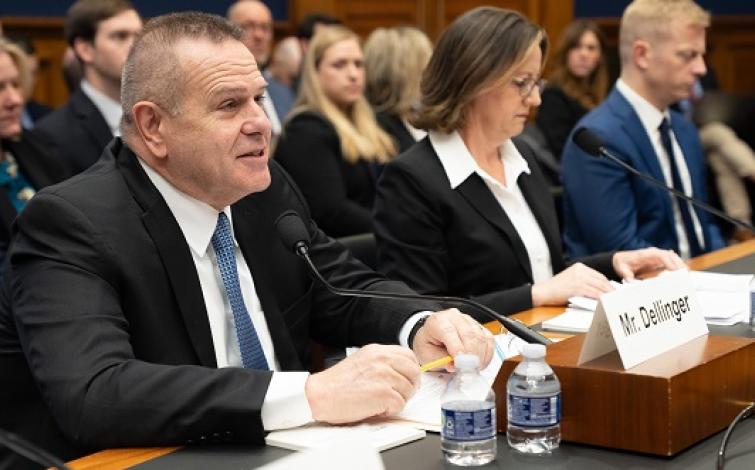As the new Congress begins, ATA Chairman Dennis Dellinger took to Capitol Hill to advocate for significant increases in funding for the nation’s transportation infrastructure.
Dellinger spoke to the House Transportation & Infrastructure Subcommittee on Highway & Transit, addressing a broad array of trucking priorities just as the committee started the reauthorization process for the federal highway bill.
His testimony emphasized the necessity for enhanced infrastructure to boost supply chain resilience and efficiency, including the reduction of over $100 billion in annual congestion costs. Congressional members queried Dellinger on how they could further support the trucking sector, which included suggestions like eliminating unrealistic environmental regulations, improving road safety, repealing the federal excise tax on heavy-duty trucks and trailers, fostering workforce development, and curtailing lawsuit abuse.
Trucking Requires Practical Environmental Regulations
The trucking sector has significantly minimized its environmental footprint through technological advancements and sensible regulations with achievable goals and practical timelines; currently, 60 trucks produce the same emissions as one truck did in 1988.
Dellinger remarked that California’s and the EPA’s rush towards zero emissions has disrupted this effective collaboration, focusing instead on a short-sighted shift to electric vehicles (EVs). An ATA-commissioned study indicated that fully electrifying medium- and heavy-duty trucks would necessitate an investment nearing $1 trillion, with electric trucks’ limited range, weight issues, and charging downtimes also presenting considerable challenges and costs.
Congress Needs to Enhance Safety Measures
Linking infrastructure spending to enhanced safety, Dellinger pointed out that motor carriers invest $14 billion annually in safety systems and training, urging Congress to contribute to improving safety. Addressing issues raised by Rob Bresnahan (R-PA), Dellinger discussed how marijuana legalization at the state and potential federal levels creates harmful public misconceptions while emphasizing the need for effective testing to discern drivers under the influence.
He also stated the importance of robust drug testing standards and how implementing hair testing could improve safety conditions. Further on the safety front, Dellinger acknowledged the alarming rise in cargo theft, which surged by 27% from 2023 to 2024, with the average theft loss increasing to $202,364 from $187,895 in the previous year.
Eliminating Outdated Taxes Will Boost the Economy
A key opportunity for reducing emissions and fostering job creation is the repeal of the long-standing federal excise tax on heavy-duty trucks and trailers. Congressman Chris Pappas (D-NH) pitched the Modern, Clean, and Safe Trucks Act he co-sponsored, explaining that passing this legislation would empower trucking companies to hire more drivers and introduce new equipment more rapidly.
Investing in Workforce Development Creates Careers
Dellinger reflected on his nearly four decades in trucking, noting that the industry provides solid employment for 8.5 million people. To attract more young drivers, he advocated for the Safe Driver Apprenticeship Pilot (SDAP) Program. Additionally, he concurred with Congressman Kevin Kiley (R-CA) that revisiting the previous administration’s independent contractor rule is essential for enabling more individuals to support their families and achieve the American Dream.
The Trucking Industry Demands an End to Litigation Abuse
The trucking community aims to ensure that justice, rather than trial lawyer profits, dictates accident litigation outcomes. Due to the exploitation of the legal system by trial attorneys, lawsuits in the trucking sector have exponentially increased in both case volume and verdict amounts. Between 2010 and 2018, the average size of large verdicts skyrocketed nearly 1,000%, from $2.3 million to $22.3 million. Dellinger and Congressman Mike Collins (R-GA) noted that these costs ultimately fall on consumers.


